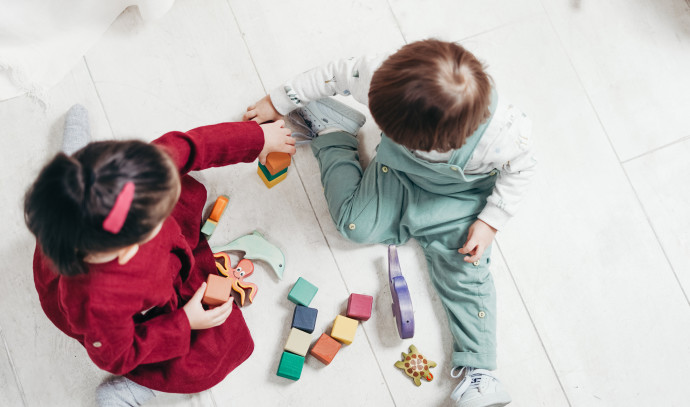Children from the age of four can learn how to live a healthy lifestyle, exercise, drink water instead of sugary drinks, avoid obesity, and even educate their parents on how to avoid chronic illnesses that results, according to a new Israeli study conducted among young people in 74 kindergartens.
The effects of an intervention program for kindergarten teachers as part of a health education program in 42 kindergartens (1,048 children) were compared to 32 kindergartens (842 children ) whose teachers have not followed this training program. The eight-month intervention program focused on goals such as basic mathematical knowledge, logical and critical thinking, self-regulation and acquisition of control, and sound decision-making skills.
The study was just published in the journal Nutrients, titled “Developing Healthy Lifestyle Behaviors in Young Ages – A Kindergarten Intervention Study.” It was carried out by researchers from the School of Public Health at Tel Aviv University; the Braun School of Public Health and Medicine at Hadassah Hebrew University; the Technion and the University of Haifa.
“Preventing childhood obesity is a major public health challenge that requires adopting healthy lifestyles from an early age,” wrote Ronit Jakobovich, Elliot M. Berry, Asia Levita and Diane Levin-Zamir. “In developed countries, more than one quarter of kindergarten-age children are overweight or obese, and their prevalence is increasing, leading to long-term effects on morbidity in adolescence and adulthood.
“From the age of three, poor eating habits were observed, including consumption of energy-dense foods and drinks, with little fruit and vegetables. Excessive screen time has been shown to encourage consumption of sugary snacks and drinks, as well as reduced physical activity. The long-term consequences of childhood obesity lead to adult obesity and chronic diseases such as metabolic syndrome, certain cancers, joint complications and psychosocial problems.
For this reason, it is important that preschool children acquire healthy lifestyle habits from an early age, when behaviors are formed that are more likely to be maintained throughout their lives.
Learn through personal experience
The team showed that even young children can learn effectively through experimentation through structured, fun activities that engage them in their design, implementation and evaluation – all while actively participating in situations that require experimentation. the application of knowledge leading to changes in behavior.
“Children act in a social context and self-determine and control their behaviors (self-regulation) through cognitive processes, as well as by observing and imitating others in their environment… The earlier the intervention program begins, the more the improvement obtained over time is great. »
The study targeted two populations. The first was for kindergarten teachers who were to learn about healthy lifestyles, design an educational intervention for children based on good nutrition and physical activity, and encourage the integrative application of mathematical-logical language to related themes and activities to daily life.
The second concerns the children themselves, who learned to live better and became aware of their bodies by talking about their feelings after physical exercise, “what is important for my body” and “what and in what quantity I eat and drink.” They were also encouraged to ask their parents to send them to kindergarten with healthy mid-morning snacks.
A total of 47% of children even expressed themselves in emotional terms, with most of them expressing their pleasure, pleasure and abilities such as “I can do more”, “My heart beats twice as fast” and “I had fun because I jumped a jump.” plot.”
At the end of the experiment, changes were reflected in the quality of their mid-morning snack, such as reduced consumption of sweets and snack foods, greater consumption of fruits and vegetables, preference for filled sandwiches of healthy toppings and drinking plain water.
“We believe these changes are related to self-regulatory abilities that develop during early childhood, including the ability to persevere, delay gratification, take responsibility, and demonstrate self-control. We also showed that kindergarten children were able to influence their parents when they brought their mid-morning snacks from home.
“The intervention program did not directly involve parents, but the improvement in the composition of snacks that parents prepared at home was likely due to children’s direct communication with them regarding teaching the subject in kindergarten .”
The team concluded that the Ministry of Education should encourage such interventions in kindergartens across the country to promote healthy lifestyles and also teach controlled sun exposure, use of a sunscreen, reduction of sedentary activity and protection of teeth. It should be taught in all classes to educate young people throughout their school years.
